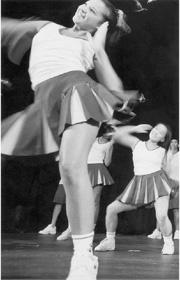ANTIDOTE TO JULIA Roberts and Meg Ryan: the fourth annual Women in Cinema Festival, which begins its weeklong run at the Egyptian Theater this Friday. The festival arrives just in time to relieve us of the indigestion caused by Stepmom and You’ve Got Mail, two recently released Hollywood films written by and targeted toward the supposedly gentler sex. While I didn’t get to preview everything that will be playing at Women in Cinema, much of what I did see, I liked.
Women in Cinema Festival
Egyptian Theater, January 29-February 4
One of the strongest offerings this year is The Apple, an Iranian film based on a true story about 12-year-old twin girls in Teheran who were rarely let out of their home. (It screens on Monday, February 1 at 9:30.) Cloistered by a blind mother and a religious father, the twins emerge from their isolation when neighbors and a social worker intervene. A blend of documentary and drama, The Apple is directed by a kid: 17-year-old Samirah Makhmalbaf, who teamed up with her screenwriter and editor father, Mohsen Makhmalbaf. While the film’s premise—that the girls are hindered by tradition—is a bit thin, and grows repetitive over 85 minutes, the filmmakers are remarkably adept at portraying the stunted girls, who move and communicate like infants.
“It would have been different if they had been boys,” laments the social worker. That point is made strikingly clear when the twins stumble through the streets of their neighborhood and encounter a young boy dangling an apple on a string from a second-story window. This sort of symbolism is ordinarily overbearing, but in this case, it works: The girls jump awkwardly for the apple while the boy raises it out of their reach. The film is also careful to suggest the parents’ psychological complexity. One even feels for the mother, whose traditions are so ingrained that she calls the girls “little bitches” after they get haircuts. With her face completely cloaked by her chador, she herself encounters the boy’s apple at the end of the film, not knowing what it is that grazes her skin.
The opening-night feature, screening at 7, is Nothing (Nic) by Polish director Dorota Kedyierzawska. While the opening shots show a couple in a sensuous embrace, the film quickly paints the husband as an abusive tyrant. When Hela asks Antoni, “Do you love me?” he mutters, “Idiot,” and gets out of bed. Already with three young children and saddled with an unwanted fourth pregnancy, Hela knows that she won’t find support from her husband, who blames the children for pretty much everything that’s fucked up in his life. Slim on characterization, Nothing eventually lapses into a one-note story: Wife seeks love from husband. Husband acts like an ogre. Wife is devastated. Repeat. What holds the viewer’s interest, however, is the beautiful camerawork. Shot mostly in an old apartment filled with shimmery light that bounces off hair, water, and chrome fixtures, the movie has the soft golden glow of aged, sepia-toned photographs. Even dirty puddles on a street look elegant.
Restless, a comedy-romance that follows two different couples, seems like fluff in comparison to the aforementioned movies, but it’s set in a fascinating place rarely seen in cinema: modern-day Beijing. Abandoning the encrusted image of an antiquated China, Restless doesn’t show anyone wearing Mao suits or harboring Cultural Revolution bitterness. Directed by Jule Gilfillan, an American filmmaker who studied at the Beijing Film School, Restless focuses on a group of worldly twentysomethings to whom the Red city is all about discos, corporations, high heels, and international love. Just when you’re about to groan at the old East-meets-West, white man with yellow woman theme, Restless gives it a new face, with long-haired hottie Geng Le, a tall Beijing actor with a chiseled face, seducing Midwestern blonde Leah (Catherine Kellner). Then there’s locally hailed David Wu, a University of Washington graduate, playing a dufus Chinese-American skateboarder who falls in love with his Chinese cousin, Qing Qing. In a cinematic nod to how far Beijing has come in the last decade, Wu even skateboards across the grounds of the Forbidden City. Restless screens Saturday, January 30 at 7, and is followed by a reception hosted by the Seattle Asian American Film Festival. Filmmakers will be in attendance.
Finally, a note must be made of the German film The Trio, about a bumbling group of pickpockets caught in a bizarre love triangle. Zobel loses his partner in crime (and bed), Karl, in an accident. Lizzie, Zobel’s flirtatious daughter, gets a young mechanic, Rudolf, to replace Karl, and from then on, father and daughter compete for the attentions of the new boy toy. Directed by Hermine Huntgeburth, the film’s biggest flaw is the quick demise of Karl, who proves himself from the start to be the most interesting and complex character of the group. Nevertheless, The Trio is demented fun, and has the most interesting bedroom scene involving a toupee not belonging to Marv Albert, which alone may be worth the price of admission. The Trio shows Thursday, February 4 at 7.






